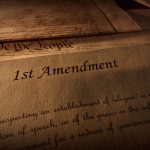September 5, 2019
By Jacob Huebert
Yesterday, the Goldwater Institute took the latest step to protect free speech rights: We’ve filed our opening brief in the U.S. Court of Appeals for the Ninth Circuit in a case challenging Oregon laws that force attorneys to join and pay dues to the Oregon State Bar to be allowed to practice law.
The
case, Crowe
v. Oregon State Bar, began when the Goldwater Institute’s clients,
Oregon attorneys Daniel Crowe and Lawrence Peterson, opened the April 2018 issue
of the State Bar’s monthly magazine and saw a statement by the State Bar
calling for new restrictions on certain speech believed to incite violence
(notwithstanding the First Amendment) and a statement by a group of other bar
associations criticizing President Trump for restricting immigration and for
allegedly “espous[ing] racist comments” and “cater[ing]” to the “white
nationalist movement.”
Crowe
and Peterson had long opposed the State Bar’s use of their mandatory dues to
advocate for and against public policies and state legislation. The magazine
statements were the last straw. They don’t want their dues to be used to fund
this or any political speech, whether
they agree with it or not.
Represented
by the Goldwater Institute, Crowe, Peterson, and an organization they belong
to, Oregon Civil Liberties Attorneys, sued to challenge Oregon’s mandatory bar
membership and dues for violating their First Amendment rights to free speech
and association.
Their
argument builds on last year’s Janus v.
AFSCME decision, in which the Supreme Court ruled that the First Amendment
forbids governments from forcing their employees to pay union fees that are
inevitably used to fund union political advocacy. If the government can’t force
its employees to pay for an organization’s political speech to be allowed to do
their jobs, it shouldn’t be able to force lawyers to do so, either.
If the
state wants to regulate lawyers, it can do without forcing them to join or pay
a bar association. We can be sure of that for a couple of reasons. For one, the
state already regulates many other professions and trades without forcing
anyone to join or pay an advocacy group. For another, 18 states already
regulate lawyers without requiring them to join or pay a bar association. In
those states, the state supreme court regulates attorneys directly and charges
them an annual registration fee to cover the cost. Two other states, California
and Nebraska, recently restricted their mandatory bar associations to using
member dues only for certain genuinely regulatory activities—not political
speech. If those states can regulate the legal profession without forcing
lawyers to pay for a bar association’s political speech, so can Oregon and all
of the other states.
Unfortunately,
the Portland federal district court dismissed Crowe and Peterson’s claims,
primarily because it concluded that the Supreme Court already approved of
mandatory bar membership and dues in a 1990 decision, Keller v. State Bar of California. But that’s not correct. In Keller, the Supreme Court expressly declined to decide whether it violates
attorneys’ freedom of association to make them join a bar association that
engages in political speech that isn’t relevant to improving the quality of
legal services and regulating the practice of law, saving the issue to be
decided in a later case. And Keller
said that the First Amendment restricts mandatory bar associations’ use of
mandatory dues in the same way that it restricts public sector unions’ use of
mandatory fees. After Janus, that
means mandatory bar dues, like mandatory union fees, shouldn’t be allowed at
all.
The
Ninth Circuit should reverse the district court’s decision. And the Supreme Court
should ultimately declare—in this case or one of the others across the country in which lawyers are challenging
mandatory bar dues—that the First Amendment protects the right of everyone,
including lawyers, to choose which groups’ political speech they will and won’t
pay for.
Jacob Huebert is
a Senior Attorney at the Goldwater Institute. He represents the plaintiffs in
the Crowe case.








